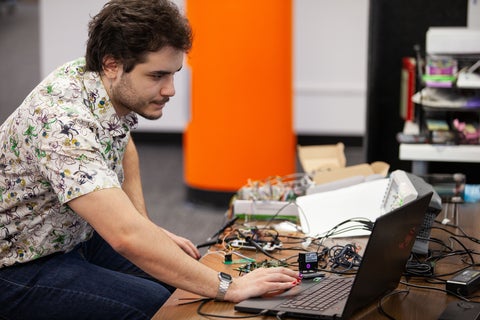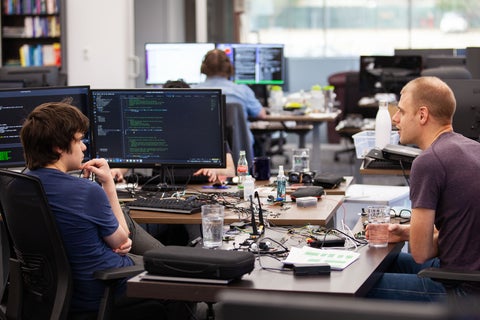Waterloo co-op students help AdHawk Microsystems set sights on visionary tech
By: Krista Henry (she/her)
Can technology help unlock connections between the eyes and how the brain processes the world?
AdHawk Microsystems believes technology can solve complex healthcare issues. University of Waterloo co-op students help the company develop tech to advance eye health and behavioral research.
The Waterloo-based deep tech startup recently unveiled MindLink Air™ ─ glasses that read its wearer’s eye health and cognitive state. The glasses use research-grade, camera-free eye-tracking technology. The data provides insights that help the wearer adjust their daily routine to improve productivity and avoid mental fatigue.
“We’re solving bigger problems than some other tech companies out there,” says Dr. Neil Sarkar (BASc ’01, MASc ’03 and PhD ’13), CEO of AdHawk Microsystems. “We’re doing analysis on the details of eye movements to track your eye and brain health. Our company is really excited about what we’re doing.”
AdHawk Microsystems hires multiple co-op students each term to help accomplish their goals. Many of the company’s founders are former Waterloo co-op students themselves.

Dr. Neil Sarkar, CEO of AdHawk Microsystems
“We started hiring co-op students before we even started the company. We hired them as part of a research lab and when those students graduated, they started AdHawk with us,” adds Sarkar.


Four key benefits of hiring Waterloo co-op students
Today, students work in every department of the company. Each term the company hires students as social media managers, algorithm and application software developers, hardware engineering co-ops and eye-tracking analytics developers.
Matthew Reynolds, user experience lead at AdHawk Microsystems, and Sarkar outlined four key benefits to hiring co-op students from Waterloo:

1. Providing depth of talent
“We find that Waterloo co-op students have a depth of talent which gives us great choices. It’s great to say we’d love to hire more than one person for this team and have options. We hire about four to seven co-op students per term. When you think about a company of 35 people that’s a sizeable percentage,” says Reynolds.

2. Bringing a growth mindset
“The mindset we get from Waterloo co-op students is one of growth. It’s good to have a core set of skills required for the job. But there’s also this expectation from Waterloo students that they want to grow and learn, which aligns with how we do development. We’re not looking for someone to stay in their lane and keep their head down, but people with new perspectives that want to work collaboratively,” says Reynolds.

3. Testing new talent
“We think of a co-op work term as a four-month-long interview. At the end of four months, there isn’t a doubt that we want this person on our team. We’ve been fortunate to hire some of the students full-time,” says Sarkar.

4. Bringing out-of-the-box thinking
“We work on some deep tech problems that are often entrenched in the way we think about our system. Having those fresh sets of eyes come in has been useful,” says Sarkar.
What projects are Waterloo students contributing to?

Matthew Reynolds, user experience lead at AdHawk Microsystems
From software to hardware engineering and robotics, students take part in many aspects of development at AdHawk Microsystems. For example, a Waterloo co-op student created the first set of robotic eyes used for testing and measurement of the company’s glasses.
“We have others that have worked on the new product, MindLink Air™,” says Reynolds. “Our student Nicholas Sweerts did a lot of the math and the implementation of the user interface. He’s doing more work in that space with visualizations and graphs.”
For Sweerts, a fourth-year Waterloo Computer Science co-op student, knowing his work is making a difference is important. He decided to return to the company for a second work term as a software applications developer because of the sense of ownership he had in his work.
I didn’t know how much work I’d actually be doing and that I’d be working on a blank slate, building a project from the ground up. It’s a great experience to do this. I’m able to ask questions as needed and know one of the developers will get back to me right away. I feel like my work will have a major part in their success and that makes me feel good.

Students are also creating apps for population studies, testing applications for bugs and creating complex circuit boards. “Students come in having a real impact and can walk away knowing they built something that’s out in the world,” Reynolds adds.